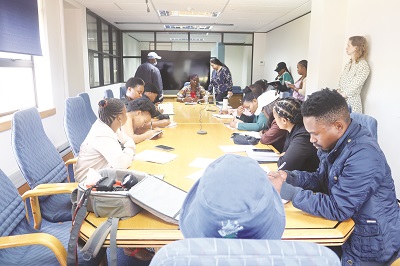By: Mpho Shelile
It is imperative that we address the challenges faced by individuals with albinism when it comes to the enjoyment of their human rights.
The principles of equality, non-discrimination, and the right to life, liberty, and security of person, which are preserved in various human rights instruments, apply to all individuals without exception, including those with albinism.
The government of Lesotho, along with the United Nations (UN), holds a press conference at the UN House Maseru. At the conference, Muluka-Anne MITI- DRUMMOND, an Independent UN expert on human rights, highlights the need for the protection of human rights for people with albinism.
She says people with albinism often face discrimination, stigma, and even violence due to misconceptions and myths surrounding the condition. In order to ensure their access to human rights, concerted efforts from governments, civil society organizations, and international bodies are required.
Several international human rights instruments, such as the Universal Declaration of Human Rights, the International Covenant on Civil and Political Rights, the Convention on the Rights of Persons with Disabilities, and the Convention on the Elimination of All Forms of Discrimination against Women (CEDAW), among others, provide a framework for protecting and promoting the rights of persons with disabilities, including those with albinism.
Efforts to ensure that individuals with albinism enjoy their human rights include advocating for inclusive policies, educating people to combat stigma and discrimination, providing access to healthcare, protecting them from violence and persecution, and creating economic empowerment opportunities.
Raising awareness on albinism while challenging harmful stereotypes is a crucial step towards guaranteeing the full realization of human rights for people with albinism.
She suggests that the upcoming census in 2026 includes a question on albinism. A multispectral approach should be established for dealing with individuals with albinism, who are considered a vulnerable social group.
These individuals should be included as part of key vulnerable groups under social development assessments for social protection benefits. A quota for persons with disabilities should be considered to also include persons with albinism in employment recruitment.
Muluka recommends the inclusion of sunscreen in national essential medicines list and it subsequent provision through the public health system to ensure it is distributed nationwide. This includes remote and rural areas.
A subsidy for visual devices for persons with albinism should also be provided. Emphasizing that it is important to train and provide more dermatologists, oncologists, and ophthalmologists in the public sector.
“Teachers, healthcare workers, and key public service providers should also receive training on albinism.
Additionally, support including psychosocial and socio-economic support should be provided to persons with albinism and their family members” she says.
“To commemorate International Albinism Awareness Day on the 13th of June every year, we should undertake targeted campaigns that engage local community leaders, particularly in rural areas.
“The aim of such campaigns is to raise awareness about persons with albinism and debunk myths and false beliefs about them. Additionally, we need to support and build the capacity of civil society organizations working on issues related to persons with albinism”.


